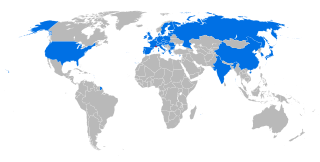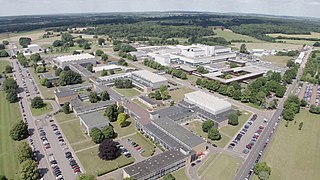
The European Atomic Energy Community is an international organisation established by the Euratom Treaty on 25 March 1957 with the original purpose of creating a specialist market for nuclear power in Europe, by developing nuclear energy and distributing it to its member states while selling the surplus to non-member states. However, over the years its scope has been considerably increased to cover a large variety of areas associated with nuclear power and ionising radiation as diverse as safeguarding of nuclear materials, radiation protection and construction of the International Fusion Reactor ITER.

The Joint European Torus, or JET, is an operational magnetically confined plasma physics experiment, located at Culham Centre for Fusion Energy in Oxfordshire, UK. Based on a tokamak design, the fusion research facility is a joint European project with a main purpose of opening the way to future nuclear fusion grid energy. At the time of its design JET was larger than any comparable machine.

ITER is an international nuclear fusion research and engineering megaproject aimed at creating energy through a fusion process similar to that of the Sun. Upon completion of construction of the main reactor and first plasma, planned for late 2025, it will be the world's largest magnetic confinement plasma physics experiment and the largest experimental tokamak nuclear fusion reactor. It is being built next to the Cadarache facility in southern France. ITER will be the largest of more than 100 fusion reactors built since the 1950s, with ten times the plasma volume of any other tokamak operating today.
A European School is a type of international school emphasising a multilingual and multicultural pedagogical approach to the teaching of nursery, primary and secondary students, leading to the European Baccalaureate as their secondary leaving qualification. Each European School is set up, financed, and operated by the international organisation, the "European Schools", controlled jointly by the member states of the European Union and the European Commission. The schools prioritise, for enrolment purposes, the children of EU staff.

The European School, Bergen is one of the thirteen European Schools. It is located in the town of Bergen in the Dutch province of North Holland. The school prioritises, for enrolment purposes, the children of European Union staff. Students must enrol in either the English, French or Dutch language sections of the school.

DEMO refers to a proposed class of nuclear fusion experimental reactors that are intended to demonstrate the net production of electric power from nuclear fusion. Most of the ITER partners have plans for their own DEMO-class reactors. With the possible exception of the EU and Japan, there are no plans for international collaboration as there was with ITER.
EFDA has been followed by EUROfusion, which is a consortium of national fusion research institutes located in the European Union and Switzerland.

The European School, Brussels I (ESB1) is a European School located in Uccle, Brussels, Belgium, and Forest, Brussels, Belgium. Originally the second of the European Schools to be founded, the European School, Brussels I, is today one of four in Brussels, and thirteen such schools across the European Union (EU). It is an all-through school, which exists primarily to provide an education to children of EU staff and officials based in Brussels leading to the European Baccalaureate as their secondary leaving qualification. Its alumni include the President of the European Commission, Ursula von der Leyen, and Boris Johnson.

Fusion for Energy(F4E) is a joint undertaking of the European Atomic Energy Community (Euratom) that is responsible for the EU's contribution to the International Thermonuclear Experimental Reactor (ITER), the world's largest scientific partnership aiming to demonstrate fusion as a viable and sustainable source of energy. The organisation is officially named European Joint Undertaking for ITER and the Development of Fusion Energy and was created under article 45 of the Treaty establishing the European Atomic Energy Community by the decision of the Council of the European Union on 27 March 2007 for a period of 35 years.
The Europa School UK is an all-through, free school and IB world school located in Culham near Abingdon in Oxfordshire. It was founded in 2012 by stakeholders of the European School, Culham and subsumed the former school's campus upon its closure in 2017. It now offers the International Baccalaureate Diploma Programme and Middle Years Programme in the secondary section and a bilingual curriculum in primary with English and one of German, French or Spanish. From its foundation until 31 August 2021, it was the only Accredited European School in the United Kingdom. This status was lost due to Brexit.

The Culham Centre for Fusion Energy (CCFE) is the UK's national laboratory for fusion research. It is located at the Culham Science Centre, near Culham, Oxfordshire, and is the site of the Joint European Torus (JET), Mega Ampere Spherical Tokamak (MAST) and the now closed Small Tight Aspect Ratio Tokamak (START).

The European School The Hague, or ESH is an Accredited European School offering nursery, primary and secondary education in 13 European languages, leading to the European Baccalaureate.
Tallinn European School, or TES, is a private, Accredited European School in Tallinn, Estonia. Founded in 2013, it is an all-through school which offers a multicultural and multilingual education leading to the European Baccalaureate as its secondary leaving qualification. TES is Estonia's largest international school, and the first of the Accredited European Schools, found across the European Union, to be established in the Baltic states.
EUROfusion is a consortium of national fusion research institutes located in the European Union, the UK, Switzerland and Ukraine. It was established in 2014 to succeed the European Fusion Development Agreement (EFDA) as the umbrella organisation of Europe's fusion research laboratories. The consortium is currently funded by the Euratom Horizon 2020 programme.

The European School of Strasbourg, or EES, is a public Accredited European School in Strasbourg, France. Founded in 2008, it is an all-through school, which offers a multicultural and multilingual education leading to the European Baccalaureate as its secondary leaving qualification.

The European School of Bruxelles-Argenteuil, also known as the EEBA, is a private, Accredited European School located on the grounds of the Château d'Argenteuil, in Waterloo, 15 km south of Brussels, Belgium. Founded in 2016, the EEBA is a partnership between the Belgian private school "Lycée Molière", and the Scandinavian School of Brussels (SSB). The EEBA, through its partnership with the SSB, offers its students the International Baccalaureate as its secondary leaving qualification, with plans to also offer the European Baccalaureate in the near future. The school caters to nursery, primary and secondary students and is equipped with facilities for boarders aged 15 and up.

The European School Copenhagen (ESC) is an Accredited European School situated in the heart of the Carlsberg district of Copenhagen, Denmark. It caters to nursery, primary and secondary level students, leading to the European Baccalaureate as its secondary leaving qualification. The ESC is affiliated to the Sankt Annæ Gymnasium, a local Danish school, and is overseen by a joint management board of the two schools.

The European Schools is an intergovernmental organisation, which has established, finances, and administers a small group of multilingual international schools, bearing the title "European School", which exist primarily to offer an education to the children of European Union (EU) staff; offers accreditation to other schools, bearing the title "Accredited European School", under national jurisdiction within EU member states to provide its curriculum; and oversees the provision of the secondary school leaving diploma, the European Baccalaureate.
An Accredited European School is a type of international school under national jurisdiction and financing, within the member states of the European Union, which have been approved, by the Board of Governors of the international organisation "The European Schools", to offer its multilingual and multicultural curriculum and the European Baccalaureate. An Accredited European School differs from a European School, in that the latter is set up, administered and financed directly by the Board of Governors of the European Schools.

The European School of Paris-La Défense is a public Accredited European School in the business district of La Défense near Paris, France. Founded in 2019, it is an all-through school, which offers a multicultural and multilingual education leading to the European Baccalaureate as its secondary leaving qualification.














